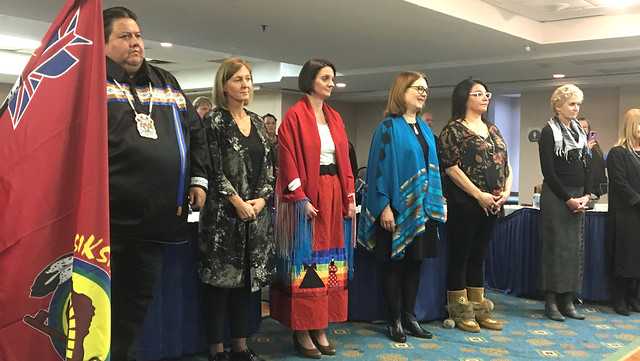This release was issued under a previous government.

L to R: First Nations Health Consortium President Tyler White, Senator LaBoucane-Benson, Minister Larivee, Minister Jane Philpott and Bigstone Health Commission CEO Samantha Greyeyes-Noskiye.
The Alberta government is taking another landmark step toward reconciliation by signing the memorandum of understanding (MOU) on Jordan’s Principle with the First Nations Health Consortium – made up of 11 Nations – and the Government of Canada.
This new trilateral MOU creates a First Nations-driven process where the consortium and the federal and provincial governments work together to coordinate services in Alberta, address gaps and share information, so that when a child needs support there are no unnecessary delays.
“Every child deserves the same access to supports, no matter where they live. Whether it’s a car seat, a splint, speech therapy or orthodontic surgery, addressing these needs in a fair and timely manner makes a huge, positive difference in the lives of children and their families. This is a key piece in our public action plan on child intervention and part of the promise we made to Alberta’s Indigenous Peoples to take action, address gaps that have been ignored for too long, and move towards true reconciliation.”
The all-party Ministerial Panel on Child Intervention identified full implementation of Jordan’s Principle in Alberta as one of its 26 recommendations. Signing the MOU addresses one of 16 immediate actions set out in A Stronger, Safer Tomorrow, Alberta’s four-year public action plan to respond to the panel’s recommendations to improve the child intervention system and strengthen support for children and families.
The MOU signing also supports the province’s commitment to advocate to the Government of Canada, along with First Nations in Alberta, to ensure equitable levels of health, social and educational services are provided for First Nations children and families.
“This MOU is a significant step in Canada’s reconciliation journey, as it will help ensure that Indigenous children and youth in Alberta can access the health, social and educational supports they need, when they need them. It should provide a clearer process to ensure First Nations children can get the help they need.”
Quick facts
- Alberta is the first province in Canada to sign a memorandum of understanding with the Government of Canada and First Nation partners to help implement Jordan’s Principle.
- Jordan's Principle is named in memory of Jordan River Anderson. He was a young boy from Norway House Cree Nation in Manitoba, who was born with multiple disabilities. The federal and provincial governments couldn’t agree who should pay for Jordan’s home-based care. As a result, Jordan remained in hospital, dying there at age five.
- In Alberta, the federal and provincial governments and First Nations all deliver programs and services with a variety of eligibility criteria. This makes it critical that everyone works together to prevent gaps in services.
- Jordan’s Principle is meant to ensure that First Nations children, youth and families do not experience denials, delays or disruptions in supports due to conflicts between levels of government over payment for services.
- The 11 partner Nations of the First Nations Health Consortium are: Bigstone Cree Nation, Loon River First Nation, Lubicon Lake Band, Peerless Trout First Nation, Whitefish Lake #459 First Nation, Woodland Cree First Nation, Samson Cree Nation, Louis Bull Tribe, Montana First Nation, Ermineskin Cree Nation and Siksika Nation.
- If a First Nations child is not receiving necessary services and supports, caregivers can call the Jordan’s Principle hotline: 1-855-JP-CHILD (1-855-572-4453), open 24 hours a day, seven days a week. They can also contact the First Nations Health Consortium at 1-844-558-8748 or visit the consortium’s website — abfnhc.com — for more information.